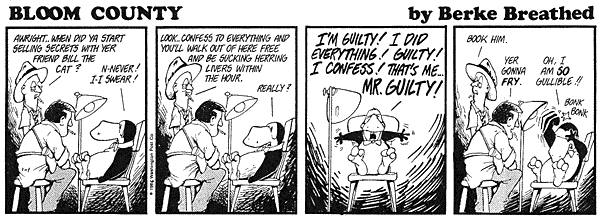Maybe a “terrorist exception” to Miranda?
Oh, gee. I thought I was done. I found another line of cases specific to terrorism cases. It is not called a “national security exception.” The case that I am reading at the moment is the case of the underwear bomber, who tried on Christmas Day, 2009, to blow up a plane flying into Detroit […]...
Read More »
More on the national security exception and Tsarnaev
More on the so-called national security exception to Miranda – I have found no case by any court in the country that finds a “national security exception” to the Fifth and Sixth Amendments. In fact, running the phrase “national security exception” through Westlaw, with a proximity search for “Miranda,” I get only one case in […]...
Read More »
National Security exception to Miranda?
The Department of Justice has been talking about the supposed national security exception to the Fifth and Sixth Amendment. As I discuss at length in my earlier post, this has its roots in the public safety exception of New York v. Quarles, 467 U.S. 649 (1984), where a defendant had been arrested in hot pursuit […]...
Read More »
No “National Security” exception available in Tsarnaev
News stories dealing with the arrest of Dzhokhar Tsarnaev have often referred to some 48-hour “national security” exception to the rules about reading Miranda warnings and questioning suspects. The articles start from one mistake, and move on to make two more. First, let’s be clear what we are NOT talking about. There is no Constitutional […]...
Read More »
Shaken Baby Syndrome — Junk Science?
One of my great interests in the law is with junk science. The jails and prisons in this country have probably thousands of people in them who have been convicted on the basis of junk science. Or, as in the case of Cameron Todd Willingham, NOT populated — he was executed for arson and murder […]...
Read More »
Fourth Circuit puts meaning to Search and Seizure rules
The Fourth Circuit strikes down a search of a black man, finding that the government’s so-called “rule of two” — where there is one handgun, there will be another — was not probable cause. This opinion is a solid defense of the proposition that all of us, regardless of skin color, should be protected from warrantless searches, and it is shows how important it is for judges to be sensitive to the experiences of minorities in our society....
Read More »
Ignition Interlock law takes effect
Virginia’s new DUI laws will pose some problems for first offenders — they will now need to have a car equipped with an ignition interlock device. Though this may reduce the number of subsequent DUI’s in the first 6 months to a year after the first conviction, it will certainly greatly increase the cost and inconvenience to offenders....
Read More »
Sex offender laws may have unintended consequences
Sex offender registry and notification laws may, in some cases, have the effect of increasing recidivism, according to new studies....
Read More »
Shaken Baby Syndrome diagnoses are bad medicine
New research shows that Shaken Baby Syndrome as an allegation of child abuse is frequently misdiagnosed, and is poorly understood by both doctors and judges....
Read More »

Why do innocent people plead guilty?
A recent article that I read discusses a problem that confronts every criminal defense lawyer — when the Commonwealth’s Attorney offers a sweet deal with a guilty plea to a lesser charge, with no jail time, but the defendant is innocent, what does the defendant do? The article, citing psychological studies and real-life examples, is clear — people plead guilty because they think it is in their best interests to do so. It’s not a moral matter — it’s a practical matter. ...
Read More »

